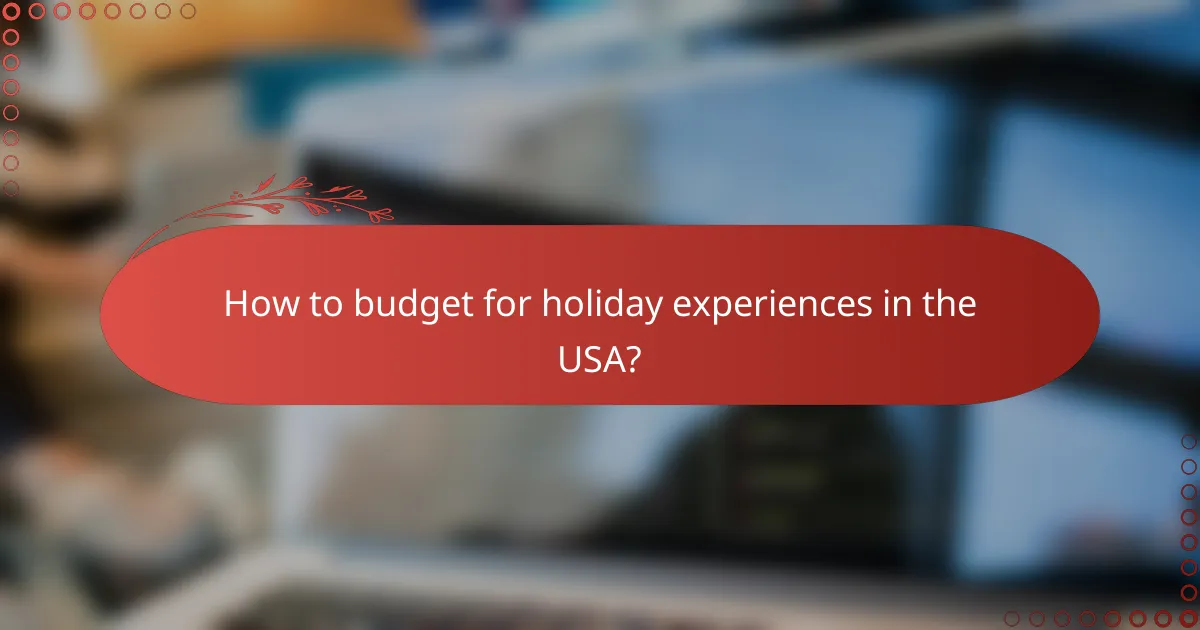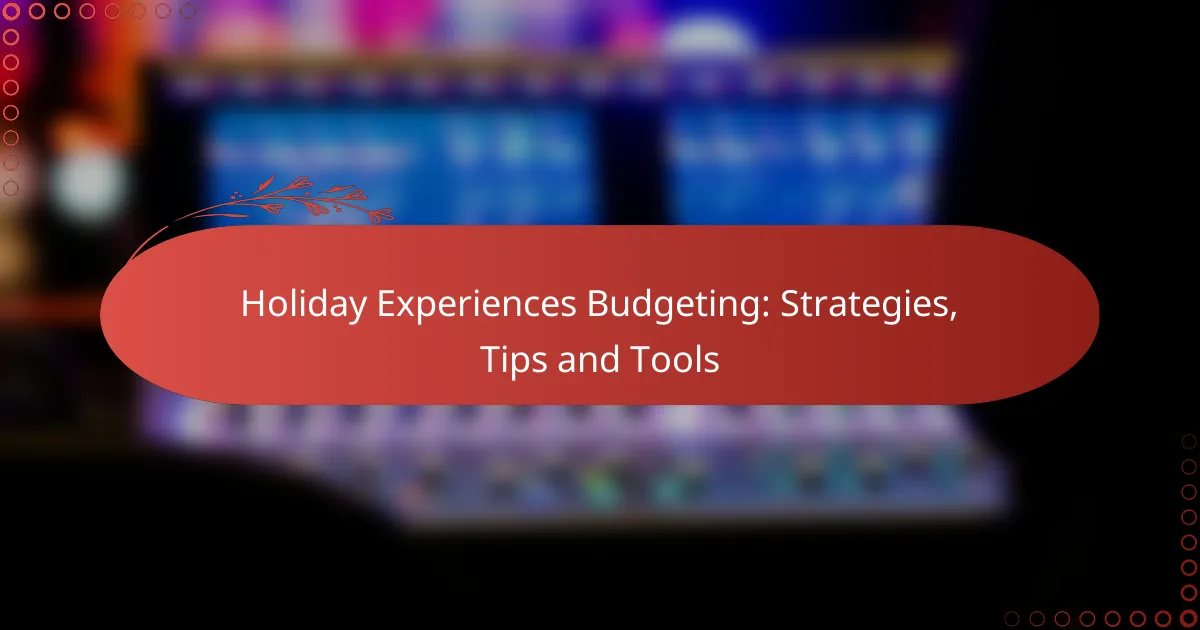Budgeting for holiday experiences is essential for ensuring a stress-free and enjoyable time. By setting clear financial goals, prioritizing your spending, and utilizing helpful tools, you can maximize your holiday fun while keeping expenses in check. With the right strategies and planning, you can create lasting memories without overspending.

How to budget for holiday experiences in the USA?
Budgeting for holiday experiences in the USA involves determining how much you can spend and planning for various expenses. A well-structured budget helps you enjoy your holiday without financial stress.
Set a total budget
Establishing a total budget is the first step in planning your holiday experiences. Consider your overall financial situation and decide on a realistic amount you can allocate for your trip, typically ranging from a few hundred to several thousand dollars, depending on your plans.
Factor in your income, savings, and any other financial commitments. Setting a clear budget helps you prioritize your spending and avoid overspending during your holiday.
Identify key expenses
Identifying key expenses is crucial for effective budgeting. Common categories include accommodation, transportation, food, activities, and souvenirs. Allocate a portion of your budget to each category based on your holiday plans.
For example, if you plan to stay in a hotel, research average nightly rates in your destination, which can vary from around $100 to $300 or more. Additionally, consider costs for attractions, which may range from free to several hundred dollars for special experiences.
Use budgeting apps
Utilizing budgeting apps can streamline your holiday budgeting process. These tools help track expenses, set limits, and provide insights into your spending habits. Popular apps like Mint or YNAB (You Need A Budget) can be particularly useful.
Many budgeting apps allow you to categorize expenses and set alerts when you approach your budget limits. This proactive approach helps you stay on track and make adjustments as necessary, ensuring a more enjoyable holiday experience.

What are effective strategies for holiday budgeting?
Effective holiday budgeting involves planning and prioritizing your spending to maximize enjoyment while minimizing financial stress. By setting clear goals, saving in advance, and taking advantage of discounts, you can create a memorable holiday experience without overspending.
Prioritize experiences
Identifying what experiences matter most to you is crucial for effective holiday budgeting. Focus on activities that bring joy and create lasting memories, such as family gatherings, travel, or special events. Allocate a larger portion of your budget to these priorities while being mindful of less significant expenses.
Consider making a list of your top three to five experiences and estimating their costs. This will help you stay focused and avoid unnecessary spending on items that do not contribute to your overall enjoyment.
Save in advance
Saving in advance is a practical way to ensure you have enough funds for your holiday plans. Start setting aside a specific amount each month leading up to the holiday season. Aim for a savings goal that covers your anticipated expenses, which might range from a few hundred to a few thousand dollars, depending on your plans.
To make saving easier, consider opening a dedicated savings account or using budgeting apps that allow you to track your progress. Automating transfers to this account can help you stick to your savings plan without the temptation to spend that money elsewhere.
Utilize discounts and deals
Taking advantage of discounts and deals can significantly reduce your holiday expenses. Look for promotions on travel, accommodations, and activities through websites or apps that specialize in deals. Signing up for newsletters from your favorite retailers can also alert you to sales and exclusive offers.
Additionally, consider using cashback or rewards programs when making purchases. These can provide you with savings or points that can be redeemed for future discounts, making your holiday budget stretch further. Always compare prices before making a purchase to ensure you are getting the best deal available.

Which tools can help with holiday budgeting?
Several tools can significantly enhance your holiday budgeting process, helping you track expenses, find deals, and create customized budgets. Utilizing these resources can lead to better financial management and a more enjoyable holiday experience.
Mint for tracking expenses
Mint is a popular budgeting tool that allows users to track their expenses in real-time. By linking your bank accounts and credit cards, Mint automatically categorizes transactions, providing a clear overview of your spending habits.
To effectively use Mint for holiday budgeting, set specific spending limits for categories like travel, accommodation, and entertainment. Regularly check your Mint dashboard to ensure you stay within your budget and make adjustments as needed.
Travelocity for deals
Travelocity is an excellent platform for finding holiday deals on flights, hotels, and vacation packages. By comparing prices across various providers, you can identify the best offers that fit your budget.
To maximize savings, utilize Travelocity’s price alerts and flexible date search features. Booking during off-peak times can also lead to significant discounts, helping you stretch your holiday budget further.
Google Sheets for custom budgets
Google Sheets is a versatile tool for creating personalized holiday budgets tailored to your specific needs. You can design a budget spreadsheet that includes all anticipated expenses, allowing for easy tracking and adjustments.
Consider using formulas to calculate totals and track spending against your budget in real-time. Sharing your Google Sheets budget with travel companions can also foster transparency and collective financial responsibility during the holiday.

What are the common pitfalls in holiday budgeting?
Common pitfalls in holiday budgeting include underestimating costs, ignoring hidden fees, and overindulging in experiences. Recognizing these issues can help travelers create more accurate budgets and avoid financial stress during their trips.
Underestimating costs
Many travelers fail to account for the full range of expenses associated with a holiday, leading to budget shortfalls. It’s essential to consider not only transportation and accommodation but also meals, activities, and souvenirs.
A practical approach is to create a detailed list of expected expenses and then add a buffer of around 10-20% to cover unexpected costs. This way, you can better prepare for any financial surprises that may arise during your trip.
Ignoring hidden fees
Hidden fees can significantly impact your holiday budget if not properly accounted for. These may include resort fees, baggage fees, or service charges that are not included in the initial price.
To avoid these surprises, research your destination and read the fine print when booking accommodations and activities. Always ask about additional charges upfront to ensure your budget remains intact.
Overindulging in experiences
While it’s tempting to splurge on experiences during a holiday, overindulgence can quickly deplete your budget. Travelers often prioritize luxury dining, expensive tours, or high-end entertainment without considering the cumulative cost.
To maintain a balanced budget, set a daily limit for discretionary spending on experiences and stick to it. Consider mixing high-cost activities with free or low-cost options to enjoy your trip without overspending.

How to evaluate holiday experience costs?
To evaluate holiday experience costs, start by identifying all potential expenses associated with your trip. This includes not just the price of activities but also supplementary costs like transportation, meals, and accommodations.
Compare similar experiences
When comparing similar holiday experiences, look at the core offerings and what each includes. For instance, if you are considering two guided tours, check the duration, group size, and additional perks like meals or entry fees.
Use a simple table to outline key features of each experience. This can help clarify which option provides better value for your budget. For example:
| Experience | Duration | Inclusions | Price (USD) |
|---|---|---|---|
| City Tour A | 3 hours | Lunch, museum entry | 50 |
| City Tour B | 4 hours | Snacks, transport | 60 |
Make sure to consider reviews and ratings as well, as they can provide insights into the quality of the experiences.
Factor in travel costs
Travel costs can significantly impact your overall holiday budget. Include expenses such as flights, local transportation, and any necessary visas. For example, a round-trip flight may range from a few hundred to over a thousand dollars depending on your destination.
Additionally, consider local transport options like public transit or car rentals. Researching these costs in advance can help you avoid surprises. For instance, a daily public transport pass in many European cities typically costs around 5-10 EUR.
Lastly, don’t forget to account for potential hidden fees, such as baggage charges or fuel costs when renting a vehicle. Keeping a detailed budget will help you manage these expenses effectively.










